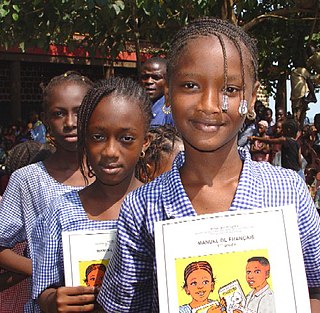
Sex education, also known as sexual education, sexualityeducation or sex ed, is the instruction of issues relating to human sexuality, including human sexual anatomy, sexual activity, sexual reproduction, safe sex and birth control, sexual health, reproductive health, emotional relations and responsibilities, age of consent, and reproductive rights. Sex education which includes all of these issues is known as comprehensive sex education, and is often opposed to abstinence-only sex education, which only focuses on sexual abstinence. Sex education may be provided as part of school programs, public health campaigns, or by parents or caregivers. In some countries it is known as "Relationships and Sexual Health Education".

A school uniform is a uniform worn by students primarily for a school or otherwise an educational institution. They are common in primary and secondary schools in various countries.

Mixed-sex education, also known as mixed-gender education, co-education, or coeducation, is a system of education where males and females are educated together. Whereas single-sex education was more common up to the 19th century, mixed-sex education has since become standard in many cultures, particularly in Western countries. Single-sex education remains prevalent in many Muslim countries. The relative merits of both systems have been the subject of debate.

Sex segregation, sex separation, gender segregation or gender separation is the physical, legal, or cultural separation of people according to their biological sex. Sex segregation can refer simply to the physical and spatial separation by sex without any connotation of illegal discrimination. In other circumstances, sex segregation can be controversial. Depending on the circumstances, it can be a violation of capabilities and human rights and can create economic inefficiencies; on the other hand, some supporters argue that it is central to certain religious laws and social and cultural histories and traditions.

Haileybury is an independent school with campuses in Keysborough, Brighton East, Berwick, Darwin, Northern Territory and Melbourne's CBD. It also has an international campus in the Tianjin outer district of Wuqing, China. Haileybury operates under the model of parallel education, which consists of Haileybury College and Haileybury Girls College. Haileybury has been described as the largest independent school in Australia.
Achievement gaps in the United States are observed, persistent disparities in measures of educational performance among subgroups of U.S. students, especially groups defined by socioeconomic status (SES), race/ethnicity and gender. The achievement gap can be observed through a variety of measures, including standardized test scores, grade point average, dropout rates, college enrollment, and college completion rates. The gap in achievement between lower income students and higher income students exists in all nations and it has been studied extensively in the U.S. and other countries, including the U.K. Various other gaps between groups exist around the globe as well.

Single-sex education, also known as single-gender education and gender-isolated education, is the practice of conducting education with male and female students attending separate classes, perhaps in separate buildings or schools. The practice of single-sex schooling was common before the 20th century, particularly in secondary and higher education. Single-sex education is practiced in many parts of the world based on tradition and religion; recently, there has been a surge of interest and the establishment of single-sex schools due to educational research. Single-sex education is most popular in English-speaking countries (regions) such as Singapore, Malaysia, Ireland, the United Kingdom, Hong Kong, South Africa and Australia; also in Chile, Israel, South Korea and in many Muslim majority countries. In the Western world, single-sex education is primarily associated with the private sector, with the public (state) sector being overwhelmingly mixed sex; while in the Muslim world public schools and private schools are sex-segregated. Motivations for single-sex education range from religious ideas of sex segregation to beliefs that the sexes learn and behave differently. As such, they thrive in a single-sex environment. In the 19th century, in Western countries, single-sex girls' finishing schools, and women's colleges offered women a chance of education at a time when they were denied access to mainstream educational institutions. The former was especially common in Switzerland, the latter in the U.S. and the U.K., pioneers in women's education.

Clayfield College is an independent, Uniting Church and Presbyterian, day and boarding school, located in Clayfield, an inner-northern suburb of Brisbane, Queensland, Australia. The College is owned and governed by the Presbyterian and Methodist Schools Association.
Adolescent sexuality is a stage of human development in which adolescents experience and explore sexual feelings. Interest in sexuality intensifies during the onset of puberty, and sexuality is often a vital aspect of teenagers' lives. Sexual interest may be expressed in a number of ways, such as flirting, kissing, masturbation, or having sex with a partner. Sexual interest among adolescents, as among adults, can vary greatly, and is influenced by cultural norms and mores, sex education, as well as comprehensive sexuality education provided, sexual orientation, and social controls such as age-of-consent laws.
The sexuality of US adolescents includes their feelings, behaviors and development, and the place adolescent sexuality has in American society, including the response of the government, educators, parents, and other interested groups.

Female education is a catch-all term for a complex set of issues and debates surrounding education for girls and women. It is frequently called girls' education or women's education. It includes areas of gender equality and access to education. The education of women and girls is important for the alleviation of poverty. Broader related topics include single-sex education and religious education for women, in which education is divided along gender lines.

Education in Ethiopia was dominated by the Ethiopian Orthodox Church for many centuries until secular education was adopted in the early 1900s. Prior to 1974, Ethiopia had an estimated literacy rate below 50% and compared poorly with the rest of even Africa in the provision of schools and universities. After the Ethiopian Revolution, emphasis was placed on increasing literacy in rural areas. Practical subjects were stressed, as was the teaching of socialism. By 2015, the literacy rate had increased to 49.1%, still poor compared to most of the rest of Africa.

Sex differences in education are a type of sex discrimination in the education system affecting both men and women during and after their educational experiences. Men are more likely to be literate on a global average, although higher literacy scores for women are prevalent in many countries. Men and women find themselves having gender differences when attaining their educational goals. Although men and women can have the same level of education, it is more difficult for women to have higher management jobs, and future employment and financial worries can intensify. Men tended to receive more education than women in the past, but the gender gap in education has reversed in recent decades in most Western countries and many non-Western countries.

Sex segregation in Iran encompasses practices derived from the conservative dogma of Shiite Islam currently taking place in Iran. Most areas of the country are segregated by sex, except universities. In many cities, there are women parks. Sex segregation prohibits males from viewing females, and age of consent laws do not exist, as all sexual activity outside marriage is illegal.
Sexual bullying is a type of bullying and harassment that occurs in connection with a person's sex, body, sexual orientation or with sexual activity. It can be physical, verbal, and/or emotional.
Discrimination in education is the act of discriminating against people belonging to certain categories in enjoying full right to education. It is considered a violation of human rights. Education discrimination can be on the basis of ethnicity, nationality, age, gender, race, economic condition, disability and religion.
The Pittwater House School, commonly called Pittwater House, is an independent non-denominational co-educational early learning, primary and secondary day school, located in Collaroy, on the Northern Beaches of Sydney, New South Wales, Australia. The school is relatively unique in providing single-sex education to both boys and girls in both primary and secondary school settings, on the one co-educational campus.
Sex differences in education in the United States refers to the specific issues, such as gender-based discrimination related to coursework and use of disciplinary action, that American students of all genders encounter. Furthermore, while sex differences in education explains the prevalence of gender-based differences in education on a global scale, the American education system includes specific forms of gender discrimination dissimilar to other countries.

Female education in STEM refers to child and adult female representation in the educational fields of science, technology, engineering, and mathematics (STEM). In 2017, 33% of students in STEM fields were women.

In a school garden, school children are set to work cultivating flower and vegetable gardens. The school garden is an outgrowth of regular school work. It is an effort to get children out of doors and away from books. It is a healthy realism putting more vigor and intensity into school work.












